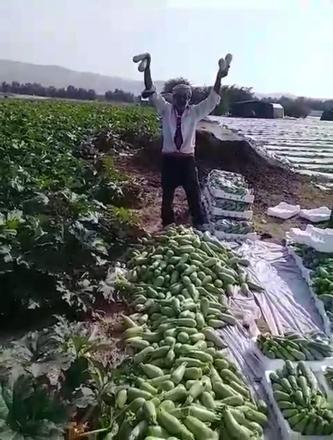- Local News
- Sun-2020-11-15 | 05:03 pm

The Ministry of Agriculture has given priority to a number of sectors to work during the comprehensive lockdown, including retail stores and wholesale markets to ensure the sustainability of production.
Ministry’s Spokesperson Lawrance Al Majali on Saturday said that the ministry has issued a list of exemptions to ease the movement of workers and vehicles of priority sectors. The lists included a good number of livestock needs and fodder, as well as water trucks to ensure the sustainability of these sectors that included poultry and dairy farms.
He added that all produced milk was moved through special trucks to dairy factories, noting that the milk was used in long-term products, the Jordan News Agency, Petra, reported.
Regarding vegetable and fruit farms, Majali said: "Although movement was allowed, the closure of the central markets and retail stores has affected farmers’ work, as they failed to supply their crops, except for the export workshops, which on Wednesday sent 95 dispatches totalling 1,650 tonnes of vegetables.
Meanwhile, the ministry said that the central markets on Saturday evening received some 6,000 tonnes of fruits and vegetables, noting that the local needs are estimated at 4,000 tonnes.
However, after being unable to go to their farms due to the four-day national lockdown, many Jordan Valley farmers harvested their crops themselves and kept the produce in the open field.
"The closure of markets and the inability of most farmers to obtain permits have prevented them from selling the crops which they paid and worked very hard to grow,” said Adnan Khaddam, president of the Jordan Valley Farmers Union.
Khaddam told The Jordan Times over the phone that some varieties of vegetables "need to be harvested, marketed and sold on a daily basis, especially cucumbers, courgettes, peppers and others”.
The farmers union president noted that if these vegetables are harvested as little as one day after the recommended date, they will be either deemed rotten or sold at low prices, which will "cause heavy financial losses for farmers.”
"The imposition of a comprehensive four-day lockdown did not take into account the needs of the agricultural sector, whether the need for the daily care of crops to maintain their permanence and quality or the marketing of the produce, both of which are important for the farmer’s profit,” added Khaddam.
Yousef Hawamdeh, a farmer and a member of the union, said that "a very small number of farmers were able to maintain permits to reach their farms, while those who could reach their farms could not find workers to harvest their crops”.
Hawamdeh added that "farmers who have workers residing in the farms could harvest the crops but could not sell them due to the market closure. All in all, whether not being able to reach their farms, hire help or sell the produce, the four-day lockdown was a disaster”.
Khaddam called on the government to "involve the farmers’ union when making any decisions affecting the agricultural sector, which is a fundamental pillar of food, social and economic security”.
The union president stressed the need to "facilitate the access of farmers and workers to the farms to enable them to take care of the crops as well as help them market their produce.”
The pandemic has "exacerbated the problems of farmers who were already suffering from labour shortages, high production costs and a marketing difficulty”, he added.
Ali Shobaki, a farmer in Ghour, said that he had to harvest what crops he could and lay it on the ground or store it in his house until the lockdown ends on Sunday.
"I was granted a permit but it was confined to myself only, which means I could not hire day labourers to help me. I alone, of course, cannot harvest my 30-dunnum farm, so I picked what I could because if I do not then not only will I lose the crops on the trees, but I will also weaken my plants and lose the whole season,” said Shobaki.
He pointed out that this process is necessary and needs labour, which means that farmers are "incurring losses that were not taken into account”.
"The farmer has already been paying operation expenses throughout the season in hope that production will at least cover the expenditures, but now he is not only not selling the produce, but also enduring additional costs,” Shobaki added.
A trending video on Facebook showed a Jordan Valley farmer standing next to hundreds of packed crops saying that he has had to pick the crops and store it at home, hoping that "at least half of it would be sold after the ban to cover the expenses of labour, transportation, water and pesticides”.
The video caught public attention, with people saying that the government "must buy the crops from farmers as they are the reason behind these losses,” as put by Facebook user Mai Omari.
Mais Reem, a citizen, also commented that "the reason behind the soaring prices in the markets is that the agricultural sector cannot keep up with its losses. Citizens are ultimately the ones to be affected by these losses as well.”









